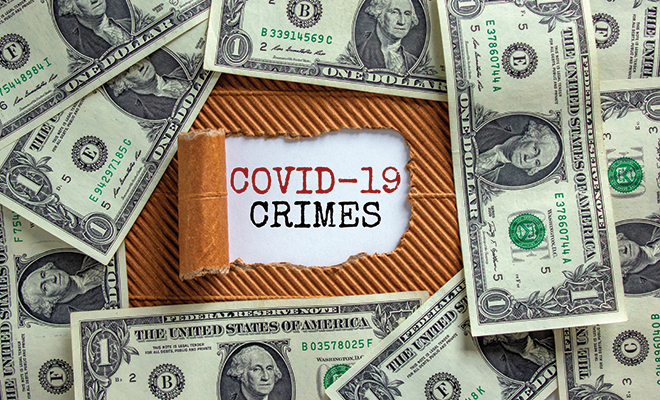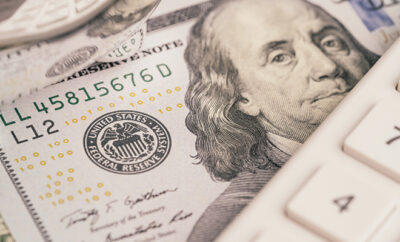
Don’t Be a Victim of COVID-19 Fraud!
As if the year 2020 wasn’t bad enough, fraudsters and scammers out to separate folks from their money and identities found new ways to do that, using COVID-19 as their crutch.
In December 2020, the second round of economic stimulus to Americans unleashed a wave of new twists on old ploys to defraud the unsuspecting. A caller or emailer might use the words “stimulus check” or “stimulus payment.” The official government term is “economic impact payment.” Others would send an email, text or social media message that states you need to verify your personal information and banking information to speed the payment. Some scammers sent a fake check with instructions to call a number to verify your personal information to cash it.
Protect Yourself
The Federal Bureau of Investigation, Department of Health and Human Services’ Office of Inspector General and Centers for Medicare & Medicaid Services have been warning the public about several emerging fraud schemes related to COVID-19 vaccines. In some, scammers are offering COVID-19 tests, HHS grants and Medicare prescription cards in exchange for personal details. The illegitimately obtained information can be used to fraudulently bill federal health care programs and commit medical identity theft.
You will not be asked for money to enhance your ranking or eligibility for a COVID-19 vaccine. Government and state officials will never call you for personal information so that you can receive the vaccine, and you will not be solicited at your door to receive the vaccine. HHS is clear: “Be suspicious of any unexpected calls or visitors offering COVID-19 tests or supplies. If you receive a suspicious call, hang up immediately.”
Bogus Cures
Shots may be in arms from the vaccine, but that doesn’t stop snake oil scams and pitches for miracle cures. Warning signs are phrases such as “ancient remedy,” “natural cure,” “new discovery” or “scientific breakthrough.”
Be wary of ads, emails or other communications that contain testimonials from “real people” about the incredible results they have had from the product. These might imply that there’s a health care industry or government conspiracy to prevent you from obtaining these miracle cures. If it promises a no-risk, money-back guarantee, buyer beware!
Stock Scams
The Securities and Exchange Commission is warning of a variation of the penny stock scam, in which unregistered investment brokers ripped off thousands of investors in the 1990s by selling them worthless stocks. The version in 2021 is to sell low-cost shares of companies that, scammers say, have a hot product or a miracle cure that will cause the stock’s value to skyrocket. What a fantasy. Do a Google search for the SEC’s EDGAR system, which will give you access to the company’s financial reports.
The cold call is a common tactic to begin a relationship and build trust, but it’s not the only one. Spam emails, direct mail, newsletters and radio and television ads can look and sound sincere, but don’t fall for them.
Phishers for Money
In 2020, the Federal Trade Commission and the Justice Department issued a warning about phishing texts and phone calls that are supposedly from contact tracers, “warning you that you’ve been exposed to someone with COVID-19. The scam texts include a link that, if clicked, downloads malware to your device. Messages from actual contact tracers working for public health agencies will not include a link, or ask you for money or personal data.”
The Federal Bureau of Investigation advises Americans to consult their state’s health department website for current information about vaccine distribution channels and warns to consult your primary care physician before undergoing any vaccination. To make sure you have the most current information, verify the spelling of web addresses; websites and email addresses that look trustworthy but may be imitations of legitimate websites. Don’t communicate with or open emails, attachments or links from anyone you don’t know, and never provide personal information of any sort via email.
If you suspect that you have been the victim of a COVID-19 fraud, immediately report it to the FBI at ic3.gov, tips.fbi.gov, or 1-800-CALL-FBI or HHS OIG at tips.hhs.gov. ■
Sources: aarp.org, oig.hhs.gov and fbi.gov.
Beware!
These tips are provided by the Department of Health and Human Services Office of Inspector General website.
• Do not respond to or open hyperlinks in text messages about COVID-19 from unknown individuals.
• Ignore offers or advertisements for COVID-19 testing or treatments on social media sites. If you make an appointment for a COVID-19 test online, make sure the location is an official testing site.
• Do not give your personal or financial information to anyone claiming to offer HHS grants related to COVID-19.
• Be aware of scammers pretending to be COVID-19 contact tracers. Legitimate contact tracers will never ask for your Medicare number, financial information, or attempt to set up a COVID-19 test for you and collect payment information for the test.
• If you suspect COVID-19 health care fraud, report it immediately online or call 800-HHS-TIPS (800-447-8477).







